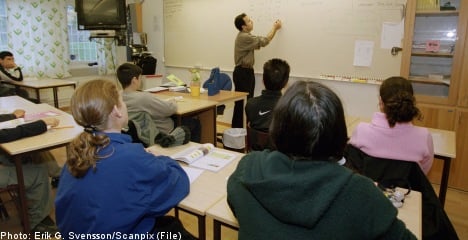Researcher Reza Kormi-Nouri’s study shows that bilingual children have a linguistic head start when they first go to school, but fall behind as they get older. The results of his study, published in the ‘Bilingualism: Language and Cognition’ journal, run counter to previous previous findings in the field.
“It’s surprising because until now we believed it was the other way around: that bilingual children do worse in the first years of school but then catch up,” said Kormi-Nouri.
Kormi-Nouri carried out two types of tests in Iran on bilingual and monolingual children aged between 7 and 12-years-old. All of the children were tested in Persian, the language used in school.
At home, the bilingual children spoke a different single language, either Turkish or Kurdish. However, the researcher said the outcome would likely have been the same for children brought up in homes where the parents spoke two different languages.
“I haven’t examined that group for this study, but we can still talk about the same effects,” he told The Local, basing his assumption on previous findings in the field.
In his study, the children were first given three minutes to come up with as many words as possible starting with a certain letter or relating to a particular category.
The younger bilingual children matched the single-language children in the letter test and scored higher in the category test. As they grew older, however, the bilingual children were overtaken, and Kormi-Nouri noted that the discrepancy widened with age.
The researcher said one possibility was that the languages created mutual disturbances as the proficiency levels balanced out.
“But there’s also an alternative explanation that’s directly opposed to this one: since the children in Iran do not receive any tuition in their home language, an imbalance develops instead between the languages,” said Kormi Nouri.
“The older the children get, the stronger their school language becomes, while the home language becomes weaker and this has a negative effect on them.”
One group formed an exception to the general trend, with Kormi-Nouri finding that children who received extra tuition in the language spoken at home continued to perform above average in tests even at a later age.
Kormi-Nouri said this was supported by previous studies he has carried out on children in Sweden who receive extra tuition at school in the language spoken outside the classroom.
“In Sweden, immigrants have maybe two to four hours a week of home language classes at school. They don’t have that in Iran,” he said.
“Since the languages help each other, when you have the home language at school it provides a major boost.”
The researcher stressed that the positive “cognitive effects” were also supplemented by the social and emotional benefits arising from the fact that the language spoken at home is respected by society at large.
For younger children, linguistic competence is tied to how words sound. Later, visual and semantic aspects increase in importance, meaning that children’s proficiency in their home language suffers if they can only read or write in the language used at school.
Kormi-Nouri concluded that more research was needed that monitored children for longer periods of time, enabling academics to compare children who learn to read and write two languages with those who speak a single language.



 Please whitelist us to continue reading.
Please whitelist us to continue reading.
Member comments